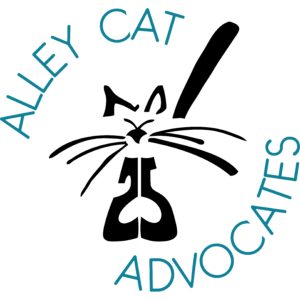Reposted from ASPCA: http://www.aspcapro.org/blog/2014/10/13/spotlight-alley-cat-advocates
 Since 1999, Louisville, KY’s Alley Cat Advocates (ACA) has spayed and neutered more than 30,000 community cats. Thanks to their Big Fix and Quick Fix programs, Operation City Kitty community outreach program, and collaboration with Louisville Metro Animal Services and Kentucky Humane Society, this ASPCA Partnership agency is making Louisville a safer place for unowned cats.
Since 1999, Louisville, KY’s Alley Cat Advocates (ACA) has spayed and neutered more than 30,000 community cats. Thanks to their Big Fix and Quick Fix programs, Operation City Kitty community outreach program, and collaboration with Louisville Metro Animal Services and Kentucky Humane Society, this ASPCA Partnership agency is making Louisville a safer place for unowned cats.
We talked with ACA’s co-founder and executive director, Karen Little, about the organization’s groundbreaking work.
ASPCApro: How did Alley Cat Advocates get started?
Karen Little: In the 1990s I worked for the University of Louisville. On my walks to and from work, I would see a number of stray cats in the community. After filling my house—and my family’s and friends’ houses—to capacity with homeless cats, I realized that adoption was not the solution to the problem. So, in 1999, my husband Hoyt and I co-founded Alley Cat Advocates to provide spay/neuter services to community cats and then return them to their neighborhoods.
ASPCApro: Yours was the first TNR program in your community. Did you run into any obstacles?
KL: In 2005, we realized that many of the cats who had been spayed or neutered, ear-tipped and vaccinated through our program were being picked up and euthanized due to local policies and ordinances about unowned cats. Then in 2007, we partnered with Louisville Metro Animal Services (LMAS) to work on progressive means of controlling the cat population, and by 2010, we had secured a joint grant to spay and neuter cats in a single targeted Louisville zip code. The intake of cats from this neighborhood was the highest in Jefferson County, and after spaying/neutering only 800 cats in this zip code, the intake numbers at LMAS decreased by 51%!
ASPCApro: That’s impressive! But didn’t you still have ordinances in place that made your work difficult?
KL: Yes, so after the successful TNR program in the targeted zip code, we turned our attention to the Louisville Metro Council. We wanted to improve one of the city’s animal ordinances that required unowned cats to be rounded up and euthanized if inside homes were not found for them. Using legislative models from other communities, we worked closely with Metro Council members to develop a revised ordinance that supported both owned and unowned cats, and also mandated TNR. This change to the ordinance passed unanimously! It got rid of the mandatory stray hold for unowned cats, so we can now spay/neuter, vaccinate and place the cats back into their neighborhoods immediately.
ASPCApro: What are you most proud of in regards to your organization’s work?
KL: Our dedication to the individual cat, while also providing sufficient volume of spayed/neutered cats to show a difference in our community, has created a culture of respect for community cats in our area. When my husband and I started the group, we asked ourselves, “If money were not an obstacle, what level of care would we provide?” The answer centered on our desire to afford community cats the same level of medical care that owned cats are often lucky enough to receive. This approach may seem extravagant and excessive but, in practice, allowed us to make the difference in our community that we hoped to make.
ASPCApro: Can you share an example of an animal who benefitted from ACA’s gold standard of care?
KL: Yes! Hunter was an ear-tipped male who was picked up by a LMAS officer after someone had seen him limping with blood running down his leg. The poor kitty had an infection due to three puncture wounds and a likely cranial cruciate ligament rupture. Thanks to our terrific partnership with LMAS, they provided Hunter’s initial medical examination and X-ray, and then ACA provided rehab care and covered the costs of medication and follow-up visits. Since this sweet boy had been with us for quite a period of time during his recovery, and no caretaker was identified in the area in which we picked him up, one of our volunteers ended up adopting him. He is doing great!
Hunter’s condition when he was brought to ACA
Hunter after rehab and TLC from Alley Cat Advocates
 Karen Little has graduate degrees in library science and music history and served as the head of the University of Louisville’s Music Library for over 24 years. She lives in Louisville with her husband, three dogs (Jimmy, Julie and Moose) and any number of cats who need medical treatment and/or hospice care.
Karen Little has graduate degrees in library science and music history and served as the head of the University of Louisville’s Music Library for over 24 years. She lives in Louisville with her husband, three dogs (Jimmy, Julie and Moose) and any number of cats who need medical treatment and/or hospice care.
Photos: Karen and Hoyt Little


